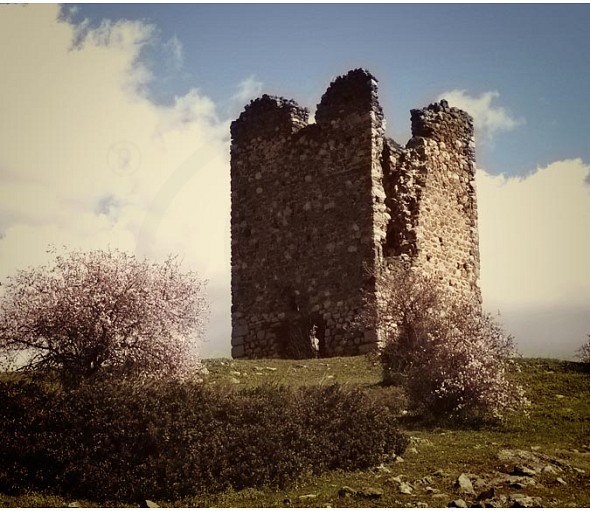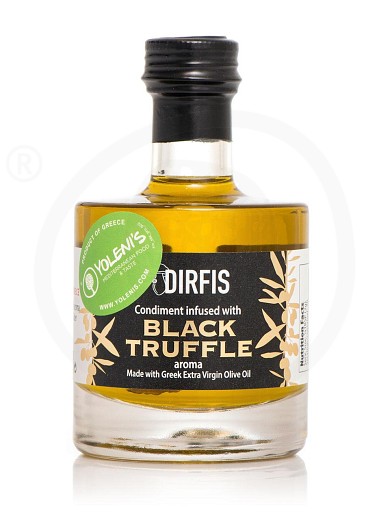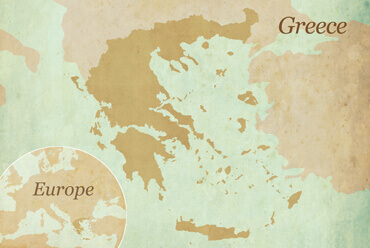Greek truffles are a rare product. Free of additives or artificial colorings, Dirfys truffles are armed exclusively with endless flavor and superior quality! Self-growing in Evia, an island known for its rare flora, this fabulous Greek black truffle enters the perfect union with extra virgin olive oil for a wildly successful gourmet treat.
By leaps and bounds, the Greek truffle, in all of its versions, is taking over the world of gastronomy. For instance, olive oil condiment with truffle, has justifiably become in recent years a daily choice. Considered to be of superb quality, the self-growing Greek truffle now ranks among the cream of the crop worldwide. This rare fruiting body of an equally rare fungus is characterized by a complex aroma, a flavour all its own, and high nutritional value. The truffle, or "hydnon" as it was called in ancient Greek, has been used in Greece since antiquity and was much sought after for its pharmaceutical and aphrodisiac properties. It even provided inspiration for such eminent writers as Pliny the Elder who called them "a wonder of nature" or as the Neoplatonic philosopher Porphyrius who called them "children of the gods".
Its intensity is such that a few drops are enough to showcase your cooking.
General Tips
- Do not pair your truffles with other spices or seasonings.
- You need but the tiniest amount to flavor your dishes.
- Always add your truffle olive oil to your recipes at the very end of their cooking time.
How To Enjoy
- A few drops are enough to make pasta dishes, risottos, frumenty soup, mashed potatoes or even a grilled steak or a fillet steak, prepared in a frying pan, stand out. . Even your popcorn, scented with a few drops of this olive oil, will assume the dimensions of a gourmet snack.
Storage Instructions
- Before or after opening, store in a cool place away from direct sources of light.
Ingredients
- Extra virgin oil olive, dried truffle 0,3%, white truffle
Net Weight
3.38fl.ozGross Weight
11.99ozWidth
2.36inDepth
2.36inHeight
4.25in
Olive oil is the base of the Mediterranean gastronomical culture. Its high content in mono-unsaturated fats ranks it among the top health products. Olive oil is the oil produced from the fruit of the olive tree. Olive trees were among the first trees to provide food to humankind that was as nourishing as it was nutritious. The olive tree’s history, cultivation, fruit, and fruit juice (none other than olive oil), are inextricably linked to the peoples of the Mediterranean and to Greece in particular. It thrives near the sea under the Mediterranean sun, it shows a preference for infertile and rocky soils, and can survive weather conditions of drought and rough winds. It is precisely because of all those reasons why olive trees thrived in Greece: The country’s outstanding terroir encourages olive trees to yield fruit that gives unique, traditional Greek products that envelop all of the history and tradition of Greece. Historians believe that the olive tree has its roots in ancient Greece. Archaeological finds throughout the country include olive presses for olive oil extraction and olive oil storage vessels that date back to times before recorded History.
Today, Greece ranks first among Mediterranean countries producing traditional, quality virgin olive oil. Greek olive oil is not just a culinary delight. It also gives its bounty generously to those who look for it. "Virgin” olive oil is the "natural juice” of the olive which contains all of the olive’s key elements (vitamins, trace elements, micro-elements). By extension, it also contains all of the beneficial properties of the olive. According to the relevant legislation, virgin olive oil must be produced solely by mechanical means and undergo only natural processing so that the end product may remain unaltered. Depending on its acidity, virgin olive oil is divided into "virgin olive oil” and "extra virgin olive oil”.
Given the fact that 75% of the olive oil produced in Greece is extra virgin, Greece ranks first in the world in extra virgin olive oil production (the term, ‘extra virgin’, stands for the highest quality olive oil), while it is the third largest olive oil producing country in the world. Extra Virgin Olive Oil is described as being almost free of acidity, expressed as oleic acid and not exceeding 0, 8%. Acidity is one of the most important criteria for olive oil quality, since the lower the acidity level, the better olive oil quality we get.
In 2006, two young men, Eleftherios Lahouvaris and Athanasios Mastroyannis, both university graduates in Agriculture but also with great experience in mushroom growing, founded "Dirfis" – a company situated Northern Evia. Being dedicated and passionate lovers of the agricultural mycology sector, they are ‘fiercely’ engaged in the cultivation of pleurotus mushrooms and in the production of products of high gastronomical and bioactive, functional value. They participate in pioneering research projects in cooperation with universities; they constantly make sure they keep up to date with the latest developments in their field. Moreover, they share their knowledge of mushrooms through international congresses and seminars.
What "Dirfis" does, is to collect and dry wild mushrooms found in the Greek forests and launch them to the market. Eleftherios and Athanasios aim at creating new products based on mushrooms and also emphasizing their nutritious and bioactive ingredients.Dirfis has installed its mushroom cultivation unit at a safety distance of 7 km from the substrate production unit to ensure that conditions of hygiene are kept high and that risk of infection during pasteurization and incubation is kept at its lowest possible level.
Dirfis chose its location at the foothills of Mount Dirfis very carefully using stringent environmental criteria. The company’s production unit is surrounded by lush vegetation and is characterized by a terrain that is ideal for the creation of the microclimate mushrooms need in order to grow. The location of the plant is free of any vehicle or industrial pollution and follows to the letter all the specifications necessary in producing wholesome products that are rid of any external polluting factors. One of the most impressive natural phenomena is how rapidly and suddenly mushrooms appear. That phenomenon is directly linked to the evaporation rate of the mycelium’s growing fruit body and osmotic pressure. By applying the appropriate ventilation and by maintaining the cultivation cabin at the right temperature and humidity, the Dirfis team ensures that the evaporation rate of its precious cultivations will remain within required levels.

Pissonas is a farming village on the foothills of the mountain range of Dirfis, on the island of Evia, northeast of the city of Chalkida.The history of the region, dates way back to ancient times. Throughout the 2500 years of its recorded history, starting from the Neolithic era, this region witnessed many conquerors - Spartans, Athenians, Macedonians, Romans, Venetians and Ottomans.In terms of its natural landscape, Evia Island is a combination of the absolutely wonderful lush green mountains and the sapphire blue water of the sea which surrounds it – a unique combination indeed! The stunning beaches, the deep blue sea with its redeeming qualities, all mingle with the majestic and imposing presence of the mountain - the rich forested peaks, the olives trees, fig trees and fir trees are all awe-inspiring!
In all likelihood, Dirfis was named after its tallest peak, Delfi, a name which changed into “Dirfis” over time. Dirfis’ peak, Delfi, is approximately 1.750m tall and in ancient times it was a place of worship of the goddess Hera. The village of Pissonas lies on the foothills of Dirfis which was quite probably named either after those who fell at some battle there (pessontes) or after the mist (poussi) which lingers in the area throughout the year. The Tower of Mostras, a medieval tower in Pissonas, is a sight worth seeing since it is still standing and remains intact. The tower was named after Spyridon Mostras, its owner, who was the last eminent landowner of the area.







